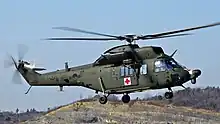KAI KUH-1 Surion
The KAI KUH-1 Surion is a twin-engine, transport utility helicopter developed primarily by Korea Aerospace Industries (KAI), Agency for Defense Development (ADD) and Korea Aerospace Research Institute (KARI) jointly with Eurocopter. In 2006, the research and development phase of the Korea Helicopter Project - Korea Utility Helicopter (KHP-KUH), costing around ₩1.3 trillion (equivalent to ₩1.67 trillion or US$1.48 billion in 2017)[5], was launched by the Agency for Defense Development in 2006.[6][7] In 2012, full-scale production of the Surion commenced; KAI has been designated as the principal manufacturer of the type.[7]
| KUH-1 Surion | |
|---|---|
.jpg.webp) | |
| KAI KUH-1 utility helicopter | |
| Role | Medium transport helicopter |
| National origin | South Korea |
| Manufacturer | Korea Aerospace Industries |
| Designer | Korea Aerospace Industries (with technical assistance from Eurocopter)[1] |
| First flight | 10 March 2010[2] |
| Introduction | 22 May 2013[3] |
| Status | In service[4] |
| Primary users | Republic of Korea Army National Police Agency (South Korea) |
| Produced | 2010-present |
| Number built | 170 (by Dec. 2020, including derivatives) |
| Developed from | Eurocopter AS332 Super Puma |
An initial force of around 245 Surions have been ordered by the Republic of Korea Army to replace their aging fleets of UH-1H utility helicopters and 500MD light utility helicopters, which have been in service for decades.[7] KAI shall also construct civilian and law enforcement variants of the helicopter.[7]
In 2017, the Surion was the centerpiece of an embezzlement scandal involving parent company KAI, the South Korean Ministry of National Defense and its Defense Acquisition Program Administration.[8][9]
Development
Origins
In December 2005, the South Korean government appointed Eurocopter as the primary partner to KAI for the then-formative Korea Helicopter Project - Korea Utility Helicopter (KHP-KUH).[10] In June 2006, KAI and Eurocopter won the KHP-KUH ₩1.3 trillion (equivalent to ₩1.67 trillion or US$1.48 billion in 2017)[5] research and development contract from the Defense Acquisition Program Administration (DAPA) to start the project. It remains Seoul's biggest arms deal ever with a non-US company. The development of the aircraft was funded 84% by the South Korean government and 16% by Korea Aerospace Industries (KAI) and Eurocopter.[11][12] At the time, it was the biggest South Korean defense contract to be issued to a non-American defense company.[13]
A production contract worth about ₩4.4 trillion (equivalent to ₩4.78 trillion or US$4.23 billion in 2017)[5] is expected to be signed around 2011 before the start of mass production. Eurocopter took a stake of 30 percent in the 2006-2012 development phase and 20 percent in the following ten-year production phase, KAI and the South Korean government held the remaining stakes in the program. As the prime sub-contractor, Eurocopter has provided technical assistance in part for developing the power transmission, main gearbox, boom and tail gearboxes, automatic flight control system and rotor mast.[7] Eurocopter experts were dispatched to KAI premises (Sacheon, South Korea) to provide support and teach KAI engineers state of the art processes and technologies for the design and manufacture of helicopters.[7]
.jpg.webp)
In June 2008, KAI announced that the first prototype KUH was to be rolled in the following month and that ground tests would begin later that year; the firm also stated that it aimed to conduct the type's first flight in early 2010 and for the first production aircraft to be delivered in 2013.[14] In August 2009, the first prototype was unveiled by President Lee Myung-bak at an unveiling ceremony in Sacheon.[15] In October 2009, it was announced that the program was to be delayed as the result of several ministries having received reduced budgets as greater priority had been placed on social welfare programs; the Ministry of National Defense announced that stability of existing defense programs had been assured.[16]
On 10 March 2010, KAI announced that a prototype had performed the maiden flight of the Surion; two test pilots and an engineer had performed a series of taxiing and hovering maneuvers, as well as a stationary hover at 30 ft (9.1m), during this initial flight.[12][17] In May 2010, following three months of flight testing, the prototype performed its first public flight demonstration.[18] In January 2011, Eurocopter and KAI established a joint venture, KAI-EC, for the purposes of marketing the Surion and handling export sales; at the time, it was envisioned that 250-300 units would be sold worldwide by 2021.[10] In December 2012, deliveries of the first Surion model formally commenced.[19] In February 2013, low temperature testing in Alaska, United States, was completed, leading to development of the KUH-1 Surion being formally recognized as completed in the following month.[19]
Further development

The KUH-1 Surion served as the basis for a navalised derivative, the Korean Naval Helicopter (KNH). By 2011, the KNH had entered into the development stage; work was being performed on the project by a partnership between KAI, Eurocopter, and Elbit Systems.[10] In January 2016, following completion of development work on the amphibious variant of the Surion, it was announced that this variant had been cleared to enter production later that year.[20][21]
Various specialised models and derivatives of the KUH-1 have been proposed. In October 2009, KAI revealed that it was studying the potential for developing an indigenous attack helicopter based upon the KUH platform as one available option for meeting an established Korean Army requirement for a new attack helicopter (AH-X). This variant was reportedly to possibly share up to 70 per cent component commonality with the base KUH version.[22] In December 2015, the Korea Forest Service and Jeju Fire Safety Headquarters, the largest civil government helicopter operator, ordered a firefighting and EMS version of the KUH-1 Surion; this requires a special airworthiness certificate.[23][24]
In 2014, DAPA's Board of Audit and Inspection begun an investigation into the level of indigenous technology used on the Surion; the investigation revealed that the technology transfer arrangement with Airbus Helicopters only covered 134 out of the 450 components used in the rotorcraft's power delivery system amid allegations of a breach of contract, Airbus Helicopters responded that it had honoured the contractual terms.[13]
In October 2015, KAI announced plans to increase production of the Surion from one helicopter per month to three per month in 2016.[25]
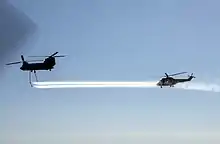
Between 2011 and 2016, the National Aerospace Laboratory of the Netherlands conducted a technology demonstration program under contract from KAI of an experimental fly-by-wire flight control system for the Surion.[26]
In 2018, the Defense Acquisition Program Administration (DAPA) certified KUH-1's ice protection system allowing the helicopter to operate in icing condition. The test activities performed include component-level development and qualification icing wind tunnel testing at Cox & Co in Long Island, NY, icing qualification testing of the engine air intake ice protection system at Rail Tec Arsenal (RTA) in Vienna, Austria, artificial icing flight testing using the US Army Helicopter Icing Spray System (HISS), and natural icing flight testing of the complete aircraft in the state of Michigan, USA.[27][28]
KAI is offering the Surion to international markets for military and civilian purposes. In late 2013, it was reported that KAI had received requests for proposals regarding the Surion from two South American nations and another Asian nation; at the time, KAI stated that the company hoped to sell 60–120 over the following 15–20 years.[1] International marketing efforts are expected to escalate in 2017, as prior to this point the overwhelming priority had been to fully develop the Surion to conform with existing domestic requirements and roles. KAI has deliberately focused on marketing the type to countries in which previous export success had been found for the KAI T-50 Golden Eagle and KAI KT-1 Woongbi trainer aircraft.[25]
KUH-1 export version prototype helicopter was unveiled at the Seoul ADEX 2019. The new prototype helicopter has been developed for four years to meet various requirements of foreign customers. This version helicopter equipped GARMIN G5000H avionics suite and strengthened airframe/structures for installation external fuel tanks and weapon wing pylon. Additionally it can accommodate VIPs and passengers with enhanced interior and Bluetooth/wi-fi connectivity.[29]
Design
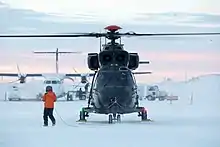
The KAI KUH-1 Surion is a twin-engine medium-sized multipurpose rotorcraft, carrying up to nine troops along with a crew of four (two pilots and two gunners in the main cabin area) in a utility transport capacity. It has been designed to be rapidly reconfigured to serve different roles, some models are also navalised.[10] The Surion can perform various duties and roles, such as military transport, law enforcement, aerial observation, search and rescue, maritime support, aerial firefighting, and for civilian purposes along with other missions.[30][31]
Power is provided by a pair of 1900shp class Hanwha Techwin T700-701K turboshaft engines, a licence-built localized development of the General Electric T700.[32][33] The T700/701K, co-developed by General Electric and Hanwha Techwin, is the first rear-drive variant of the T700 engine and features a -701D common core, high-efficiency counter-rotating power turbine, and a new FADEC system.[34] The exhausts of the engines are equipped with large infrared suppressors; these have been adapted from those used on the AS332.[15] Airbus Helicopters manufactures various elements of the Surion's transmission;[35] the lower-than-intended level of indigenous production of these components has been a point of controversy.[13]
The Surion is equipped with various survivability and damage reduction features. Both the airframe and the cockpit have been made bulletproof against small arms fire. The airframe, tail rotor, and the rotor blades used on both the main and tail rotors are of a crashworthy construction; anti-explosion sealed fuel tanks are also used. The main gearbox is capable of flying for a limited period after suffering the loss of lubricating oil. Various electronic defensive measures are incorporated onto the Surion, such as a countermeasures dispenser system (CMDS), radar warning receiver (RWR), laser warning receiver (LWR).[31]
British firm Cobham plc provides navigation and communication equipment for the Surion.[36] Sandle Avionic's HeliTAWS multi-hazard avoidance system is installed on Surions in police service.[37] Elbit Systems of Israel produces the helmet mounted display (HMD) used on the Surion, the HMD allows the crew to conduct full day-and-night operations.[15]
Operational history
On 22 May 2013, a handover ceremony of ten Surions was conducted to mark the helicopter's deployment at the Army Aviation School in Nonsan, South Chungcheong Province, attended by President Park Geun-hye.[38][39]
The KUH-1 performed its first operational mission in August 2015, conducting MEDEVAC in the aftermath of North Korean artillery shells that struck South Korean territory near the Korean Demilitarized Zone.[25] Since entering service, the Surion has reportedly held an availability rate in excess of 80 percent.[25]
The Surion was grounded in July 2016 in response to the CHC Helikopter Service Flight 241.[40] In late 2016, deliveries of the Surion were halted while a resolution for an icing issue that was discovered during winter testing was worked upon.[41] In late 2017, the Surion underwent a repeat of its icing trials to validate this aspect of its performance.[42]
In July 2020, the South Korean Army retired the last of its UH-1H helicopters after 52 years of operation, the type being replaced by the Surion.[43] The Surion may also replace South Korea's inventory of 103 UH-60P Black Hawk helicopters, but in October 2020 a lawmaker raised concerns that DAPA's decision to retire them in favor of producing 130 additional KUH-1s would cost more than upgrading them while delivering a helicopter with worse endurance, range, and carrying capacity.[44]
Variants
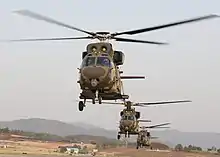
The following variants were planned by KAI aside from the manufacture of the Surion.[6][45]
KUH-1 Surion (Transport)
- A basic military utility variant, operated in quantity by the Republic of Korea Army.
KUH-1M (MEDEVAC)
- A medical evacuation variant.[46] It is equipped with a hoist for lifting patients, a weather radar, a detachable auxiliary fuel tank, a traffic collision avoidance system, medical equipment and motorized stretcher system to treat six patients, and additional communications. First flight occurred on 25 January 2016 and 8 KUH-1M helicopters were delivered to ROKA in 2020.[47][48][49]
MUH-1 Marineon (Amphibious)
- A land- and sea-based amphibious variant for the Republic of Korea Marine Corps, it has a 96 percent part commonality with the Surion. Modifications include an integrated flotation system, auxiliary fuel tank, and specialised radio equipment.[50] It also has a folding main rotor for use aboard Dokdo-class amphibious assault ships; the Marineon first flew on 19 January 2015.[51] In December 2016, KAI secured a contract to deliver 30 Marineons to the Marine Corps,[52] with the first two delivered in January 2018.[53]
- In April 2021, DAPA approved a project to develop an attack version of the Marineon.[54]
- In December 2022, KAI was awarded a contract to develop an airborne mine countermeasures (AMCM) system, adapting the Marineon for the role. The equipment will comprise laser mine search equipment, an underwater autonomous mine search vehicle, and an unmanned mine neutralisation system to search, identify, and defuse mines.[55]
MAH Marineon (Marine Attack Helicopter)
- Attack Variant of the MUH-1 Marineon for the Republic of Korea Marine Corps revealed at ADEX 2021. Comes with 4 hardpoints and a chin-mounted turret.[56][57]
KUH-1 ASW (Anti-Submarine Warfare)
- A proposed naval variant[58] equipped with torpedoes and anti-ship missiles.[25]
.jpg.webp)
KUH-1P Chamsuri (Law Enforcement)
- A law enforcement variant chosen by the Korean National Police Agency (KNPA) for its Police Helicopter Project.[59] Equipped with a weather radar, traffic collision avoidance system, inertial navigation system, and an external hoist and cameras for rescue duties (extra electronics are needed compared to ordinary police helicopters for operations near North Korea, which frequently conducts jamming operations).[60] There are 10 KUH-1Ps in service and KNPA has signed contract for two additional Chamsuri in 2020.[61]
KUH-1FS (Forest Service)
- A firefighting and SAR variant. KAI delivered the first example to Korea Forest Service (KFS) in 2018. The KUH-1FS has capabilities to conduct its main missions, such as prevention and suppression of forest fire and rescue activity upon occurrence of mountain accidents with fire-fighting belly tank system, rescue hoist, cargo hook, HTAWS, and so on.[62]
KUH-1EM (Emergency Medical Service & Firefighting)
- A medical service, firefighting, and SAR variant based on the Surion and was deployed at Jeju Fire and Safety Headquarters in 2018. The KUH-1EM is equipped EMS kit, stretcher system, belly tank system, weather radar, rescue hoist, air-conditioning system, aux. fuel tank, belly tank, emergency floatation system, etc. to conduct diverse missions. National 119 Rescue Headquarter and Gyeongnam Fire Department placed an order for KHU-1 emergency medical helicopters in 2020.[62][63][64]
KUH-1CG (Coast Guard)
- A maritime variant operated by the Korea Coast Guard with advanced mission equipment such as surveillance radar, EO/IR, AIS, SAR-DF, external fuel tanks, air-conditioning system, rescue hoist, emergency floatation, etc. to maintain maritime security and conduct search and rescue. KAI delivered 2 KUH-1 CGs to the Korea Coast Guard in 2019.[65] A second order was made in 2018.[66]
KUH-1E (Export)
- An export version of the Surion that can perform both utility and attack missions. It features stub wings able to mount gun pods, anti-tank and anti-aircraft missiles, and rocket pods; is fitted with the Garmin G5000H touch-screen glass-integrated avionics system, TACS II traffic collision avoidance system, and a three-dimensional weather radar in the nose.[67]
KUHC-1 (Civil)
- Certified and configured for civil purposes such as emergency patient transfer, fire suppression and search-and-rescue missions. Approved for use by the Korean Ministry of Land, Infrastructure and Transport.[68]
Operators
Current operators
- Republic of Korea Army: 245 KUH-1 Surions on order. The deliveries, which started in 2012, will take for eight to ten years.[69] 134 in service as of December 2020.[70]
- Republic of Korea Marine Corps: 30 amphibious variant ordered.[70] 13 Marineon helicopters are in service as of December 2020.
- National Police Agency: 2 KUH-1P aircraft ordered, both delivered by 12 February 2014.[71] In December 2013, KAI received an additional order from National Police Agency.[72] A third was added in late 2015, and a fourth order in 2017.[60] In 2020, additional 2 helicopters are ordered. As of December 2020, 8 police helicopters are in service.[61]
- Korea Forest Service: Korea Aerospace Industries (KAI) has been awarded a contract by the Korea Public Procurement Service to provide a variant of KUH Surion helicopter to the Korea Forest Service (KFS), the company announced on 7 December 2015. The service's KUH-1FS was delivered in 2017 and fitted with a 528-gal (2,000-l) belly water tank and a rescue hoist.[73]
- Jeju Fire Department: Contract to provide a firefighting helicopter for Jeju Fire Safety Headquarters. The 25-billion-won helicopter will likely be launched in 2015.[74] The KUH-1EM was delivered to Jeju Fire and Safety Department Headquarters in 2018.[62]
- Korea Coast Guard: The Korea Coast Guard (KCG) signed a deal with Korea Aerospace Industries in 2016 for 2 helicopters and the helicopters were delivered in 2019, the KCG ordered an additional helicopter, it will be delivered in 2021.[66][75]
- Korea Aerospace Industries (KAI): The company itself operates four prototype units and one export version helicopter.[70][76]
Potential customers
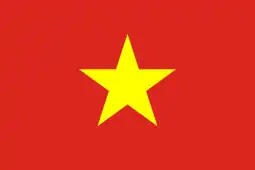 Vietnam: In mid-2023, Korea Aerospace Industries (KAI) has signed a Memorandum of Understanding with Viettel Aerospace Institute (VTX) to "cooperate in developing and producing helicopters". By that, KAI and VTX plan to collaborate on the development and production of helicopter's rotary wings.[77][78] The agreement is expected to boost KAI's presence in the Southeast Asian helicopter market while eventually making Vietnam a very potential customer of the Surion. Vietnamese President Võ Văn Thưởng has revealed to the President of South Korea Yoon Suk Yeol that he will encourage negotiations with Korean firms to find replacements for Vietnam's aging helicopters, while KAI and VTX will together "explore the Vietnamese helicopter market" alongside the mentioned technology cooperation.[77]
Vietnam: In mid-2023, Korea Aerospace Industries (KAI) has signed a Memorandum of Understanding with Viettel Aerospace Institute (VTX) to "cooperate in developing and producing helicopters". By that, KAI and VTX plan to collaborate on the development and production of helicopter's rotary wings.[77][78] The agreement is expected to boost KAI's presence in the Southeast Asian helicopter market while eventually making Vietnam a very potential customer of the Surion. Vietnamese President Võ Văn Thưởng has revealed to the President of South Korea Yoon Suk Yeol that he will encourage negotiations with Korean firms to find replacements for Vietnam's aging helicopters, while KAI and VTX will together "explore the Vietnamese helicopter market" alongside the mentioned technology cooperation.[77]
Failed bids
 Philippines: In January 2019, it was reported that attempts to sell the Surion to the Philippines did not materialize.[79] The Sikorsky UH-60 Black Hawk was selected by the Philippine Air Force instead.[80]
Philippines: In January 2019, it was reported that attempts to sell the Surion to the Philippines did not materialize.[79] The Sikorsky UH-60 Black Hawk was selected by the Philippine Air Force instead.[80]
Accidents and incidents
- In July 2018, a MUH-1 Marineon crashed at Pohang Airport, South Korea killing 5 crewmembers and injuring another one. The helicopter was on a maintenance test flight when it went down at a height of 10m and caught fire. A committee was formed to determine the exact cause of the crash, however the mechanical failure is obvious as the main rotor had separated from the aircraft during take-off.[81][82][83] On 21 December 2018, the final report from a Joint investigation into a fatal crash of Marineon helicopter determined that the defective rotor mast was first caused during the forging process. The faulty rotor mast was supplied by Airbus Helicopters, but manufactured by Airbus Helicopters contractor, Aubert & Duval S.A.[84][85] As a follow-up measure, the French government has agreed to guarantee the quality of key helicopter parts including rotor mast produced by Airbus to South Korea for the KUH-1 helicopter.[86]
Specifications (KUH-1)
Data from KAI
General characteristics
- Crew: 2 pilots
- Capacity: 13 passengers (including 9 troops - KUH-1) - up to 18 passengers with the KUH-1E variant
- Length: 19 m (62 ft 4 in) including rotors
- Width: 3.3 m (10 ft 10 in) (fuselage)
- Height: 5 m (16 ft 5 in) with tail rotor
- Max takeoff weight: 8,709 kg (19,200 lb)
- Useful lift: 2,700 kg (6,000 lb) of external load
- Powerplant: 2 × General Electric / Hanwha Aerospace T700-701K turboshaft, 1,383 kW (1,855 shp) each with dual-channel FADEC
Performance
- Maximum speed: 270–283 km/h (168–176 mph, 146–153 kn)
- Range: 828 km (514 mi, 447 nmi) with auxiliary fuel tank
- Service ceiling: 4,595 m (15,075 ft)
- Hovering ceiling: 2,717 m (8,915 ft)[87]
Armament
- Guns: A couple of 7.62mm pintle-mounted machine gun pods
Removable pylons or hardpoints for heavier gun pods, air-launched rockets, and/or anti-tank guided missiles
See also
| External video | |
|---|---|
Related development
Aircraft of comparable role, configuration, and era
- AgustaWestland AW149
- AgustaWestland AW189
- Airbus Helicopters H175
- Bell 525 Relentless
- NHIndustries NH90
- Mil Mi-8/Mil Mi-17
- Sikorsky UH-60 Black Hawk
- Sikorsky S-92
- Harbin Z-20
Related lists
References
- Waldron, Greg. "KAI eyes export market for Surion." Flightglobal.com, 30 October 2013.
- Kwon, Kyongsong (29 March 2013). "South Korea's Utility Helo Makes Maiden Flight". Korea News. hankooki.com. Archived from the original on 23 July 2012.
- Army deploys Surion copters. koreatimes.co.kr, 22 May 2013.
- Jung, Sung-ki (11 March 2010). "South Korea's KAI Surion finishes development". Defence News. Army Times Publishing Company. Archived from the original on 6 April 2013.
- 1906 to 1911: Williamson J. (1999), Nominal Wage, Cost of Living, Real Wage and Land Rent Data for Korea 1906-1939 1912 to 1939: Mizoguchi, T. (1972). Consumer Prices and Real Wages in Taiwan and Korea Under Japanese Rule. Hitotsubashi Journal of Economics, 13(1), 40-56. Retrieved May 21, 2021. Afterwards, consumer price index from Statistics Korea. Consumer Price Index by year. Retrieved 3 April 2018
- Wendell Minnick and Jung Sung-Ki (23 October 2009). "S. Korea's Defense Industry Shows Progress at Show". Defense News.
- "KAI and Eurocopter reveal the Surion". Shepard. 2009-07-31. Archived from the original on 2010-03-15. Retrieved 2010-04-12.
- Park, Hyong-ki (18 July 2017). "Korea Aerospace Industries hammered amid scandal". koreatimes.co.kr. Korea Times. Retrieved 11 May 2018.
Auditors found that the state-run Defense Acquisition Program Administration (DAPA) has been covering up a number of defects with KAI's Surion chopper, including problems with its engine and lightning protection.
- Yeo, Jun-suk (21 September 2018). "KAI vice president found dead amid corruption scandal". koreaherald.com. Korea Herald. Retrieved 11 May 2018.
One of the allegations facing Ha is that that the company made at least 24 billion won ($21.3 million) in illicit profits by inflating development costs for Surion utility helicopters, T-50 supersonic trainer jets and FA-50 light attack planes.
- "Eurocopter reinforces its commitment to strengthen the Republic of Korea's aerospace industry, and highlights the Surion and its naval derivative." Vertical, 19 October 2011.
- "한국형 기동헬기 실물모형 공개". donga.com. 15 October 2007. Archived from the original on 20 August 2014.
- Donald, David. "Korea's Surion Helicopter Flies." AIN Online, 15 March 2010.
- "Local helicopter manufacturing is expensive flop." Korea JoongAng Daily, 22 December 2014.
- Govindasamy, Siva. "PARIS AIR SHOW: Korea Aerospace to roll out utility helicopter prototype in July." Flight International, 14 June 2009.
- "Surion: Eurocopter's Korean KHP/KUH Helicopter Deal". Defense Industry Daily. 4 August 2009.
- Siva Govindasamy (1 October 2009). "South Korea to delay indigenous fighter, attack helicopter programmes". Flight International.
- Francis, Leithan. "PICTURES: Korea Utility Helicopter makes first flight." Flight International, 16 March 2010.
- "Korea Utility Helicopter demonstrates capabilities." Korea Times, 22 May 2010.
- "History." KAI, Retrieved: 23 June 2016.
- Perrett, Bradley."Marines Version OF KAI Surion Ready For Production." Aviation Week, 5 January 2016.
- Maass, Ryan. "KAI completes Surion-variant helicopter development." United Press International, 29 December 2015.
- Govindasamy, Siva. "KAI reveals options for army attack helicopter." Flight International, 21 October 2009.
- "South Korea Forestry Service Orders Surion; Russia Protests." Rotor &Wing, 1 December 2015.
- "[뉴스경남] 제주도 소방헬기 국산 수리온 선정". 뉴스경남. Retrieved 2021-03-26.
- KAI readies to boost Surion production in 2016 - Flightglobal.com, 23 October 2015
- "KAI's Surion Fly-By-Wire flight control system successfully tested." National Aerospace Laboratory, 7 April 2016.
- Asia, Defence Review (2018-06-04). "KAI Successfully Completed the Second Artificial Icing Campaign". Defence Review Asia. Retrieved 2021-03-30.
- Hoff, Stefan van 't; Lammers, Karel; Hwang, Yoo Sang; Kim, Jik Soo; Kim, Kyung Sam (2019-06-10). "Korean Utility Helicopter KUH-1 Icing Certification Program". SAE International Journal of Advances and Current Practices in Mobility. 2 (1): 205–215. doi:10.4271/2019-01-1989. ISSN 2641-9637. S2CID 150115351.
- Jeong, Jeff (2019-10-17). "See KAI unveil a new export version of the Surion helo, following a fatal crash last year". Defense News. Retrieved 2021-03-26.
- Donald, David. "Eurosatory 2016: Versatile lifter [ES2016D5]." IHS Jane's 360, 17 June 2016.
- "KUH-SURION." KAI, Retrieved: 22 June 2016.
- "Turboshaft Power Supporting Global Markets and Missions". aviation.ca. 9 July 2006.
- "The T700 Engine | GE Aviation". www.geaviation.com. Retrieved 2021-03-29.
- "GE's T700 Engines To Power Korean Helicopter Program (KHP)". GE aviation.com. 19 July 2006. Archived from the original on 9 March 2016. Retrieved 6 September 2014.
- "History: From Eurocopter to Airbus Helicopters." Airbus Helicopters, Retrieved: 22 June 2016.
- Waldron, Greg. "Cobham to supply antennas and avionics for KUH." Flight International, 22 December 2010.
- Waldron, Greg. "Sandel Avionics to provide avoidance system for S Korea police's Surions." Flight International, 20 June 2012.
- "President marks deployment of Korea's 1st military chopper." Archived 2016-08-20 at the Wayback Machine Korea.net, 23 May 2013.
- Seung-woo, Kang (22 May 2013). "Army deploys Surion Copters". Korea Times.
- "H225 crisis grounds South Korea's Surion". Flight International. 8 July 2016.
- Waldron, Greg. "Korea's Surion beset by icing issue amid gearbox grounding." Flight International, 30 September 2016.
- "'Surion' chopper to take anti-icing test again". 2017-07-26.
- Army's UH-1H choppers retired after 52 years of service. The Korea Herald. 27 July 2020.
- South Korea to replace Black Hawks with homemade Surion helos, says lawmaker. Defense News. 9 October 2020.
- "KAI KOREA AEROSPACE INDUSTRIES, LTD". www.koreaaero.com. Retrieved 2021-03-28.
- "Gov't taps KAI to develop medevac choppers for S. Korean Army". yonhapnews.co.kr. 2014-08-03. Retrieved 2014-08-05.
- Waldron, Greg. "PICTURE: Medevac Surion conducts maiden flight." Flightglobal.com, 28 January 2016.
- "Medical transport variant of KAI's Surion helicopter performed its maiden flight." Airrecognition.com, 25 January 2016.
- "KAI completes deliveries of KUH-1M medevac helicopters to RoKA". Janes.com. Retrieved 2021-03-28.
- "KAI to develop amphibious assault variant of Surion." Flightglobal.com, 18 April 18, 2013.
- "PICTURES: Amphibious assault Surion makes maiden flight." Flightglobal.com, 23 January 2015.
- Waldron, Greg. "KAI secures deal for 30 amphibious Surions". FlightGlobal.
- "South Korea's Marine Corps receives first two MUH-1 Marineon choppers". airrecognition.com.
- S. Korea pushes ahead with development of homemade attack choppers for marine force. Aju Business Daily. 27 April 2021.
- "South Korea progresses airborne MCM plans with KRW345 billion contract with KAI". Janes Information Services. 27 December 2022. Archived from the original on 27 December 2022.
- "KAI Unveils New MAH Marineon Helicopter at ADEX 2021 - Naval News". 2023-06-09. Archived from the original on 2023-06-09. Retrieved 2023-06-09.
- "MAH-1 - KAI Surion Marine Attack Helicopter". 2022-01-23. Archived from the original on 2022-01-23. Retrieved 2023-06-09.
- "KAI, Eurocopter propose naval variant of Surion". flightglobal.com. 2011-10-24. Retrieved 2014-08-05.
- "KAI Surion chosen to replace Korean police helicopters". shephardmedia.com. Retrieved 2014-08-05.
- "South Korea buys a 4th Surion helicopter for law enforcement missions." Airrecognition.com, 21 October 2015.
- Waldron2020-08-21T03:31:00+01:00, Greg. "Seoul orders two KUH-1P Chamsuri police helicopters". Flight Global. Retrieved 2021-03-28.
- Asia, Defence Review (2018-05-25). "KAI Completes Delivery of the First Surion Forest Service version". Defence Review Asia.
- "KAI "경남 소방본부 특수구조단에 수리온 납품한다"". biz.chosun.com (in Korean). 2020-06-21. Retrieved 2021-03-29.
- "한국항공우주산업 블로그 : 네이버 블로그". blog.naver.com. Retrieved 2021-03-29.
- Herald, The Korea (2019-12-20). "KAI delivers two Surion helicopters to Coast Guard". www.koreaherald.com. Retrieved 2021-03-29.
- "HeliHub.com Korean National Police to expand KUH-1 fleet to 10". helihub.com. Retrieved 2021-03-29.
- "South Korea shows upgraded Surion helicopter for export, naval attack variant for local requirement". Asia Pacific Defense Journal. Retrieved 2021-11-03.
- "KUHC-1 Civil Helicopter". Korea Aerospace Industries. Retrieved 2023-02-22.
- "KAI secures $1.6bn Surion helicopter contract". army-technology.com. 2013-12-22. Retrieved 2014-08-05.
- Greg Waldron (30 December 2016). "KAI secures deal for 30 amphibious Surions". FlightGlobal.
- "국산 헬리콥터 '수리온' 경찰에서 임무 수행". yonhapnews. 2014-02-11. Retrieved 2014-07-17.
- "2013년 12월, KAI에 어떤 일이 있었나?". KAI blog. Archived from the original on 2015-03-11. Retrieved 2015-03-11.
- "Surion chopper to be used by Korea forestry service". koreaherald. 2015-12-07. Retrieved 2017-12-08.
- "Jeju to get its first multipurpose firefighting helicopter". kctvjeju.com. Archived from the original on 2016-06-04. Retrieved 2016-05-04.
- "해양경찰청". www.kcg.go.kr (in Korean). Retrieved 2021-03-30.
- Jeong, Jeff (October 17, 2019). "See KAI unveil a new export version of the Surion helo, following a fatal crash last year". Defense News.
- Hoàng Phương, Ly. "Các công ty công nghiệp quốc phòng và năng lượng Hàn Quốc đạt được thành quả sau chuyến thăm Việt Nam của Tổng thống Yoon…Ký kết hợp tác với nhiều DN Việt Nam" [South Korean defense industry and energy companies have had great outcomes from President Yoon's state visit to Vietnam...Signing many agreements with Vietnamese corporations]. Aju News Vietnam (in Vietnamese). Retrieved 2023-06-27.
- Do, Byung-Uk. "KAI joins hands with VTX to enter Vietnam's helicopter market". KED Global. Retrieved 2023-06-27.
- https://www.koreaherald.com/view.php?ud=20190105000028
- https://www.philstar.com/headlines/2018/12/07/1875028/air-force-chooses-black-hawk-turkey-attack-choppers-lorenzana
- ARIRANG NEWS (18 July 2018). "Footage released of deadly marine corps helicopter crash". Archived from the original on 2021-12-21 – via YouTube.
- "Five killed in South Korean helicopter crash - Jane's 360". www.janes.com.
- "Five Killed, One Injured in South Korea Helicopter Crash". www.defenseworld.net.
- "Marine Chopper Crash Caused By Rotor Mast Fracture: Investigators". TBS (in Korean). 2018-09-21. Retrieved 2021-03-30.
- "Defective French part blamed for causing Marine helicopter crash". www.ajudaily.com. 2018-12-21. Retrieved 2021-03-30.
- 오석민 (2019-06-25). "French gov't guarantees quality of key parts for S. Korean helicopter". Yonhap News Agency. Retrieved 2021-03-30.
- "우리나라 최초 국산헬기 SURION(수리온) 모습 공개". koreaaero.com. Retrieved 2014-09-21.
